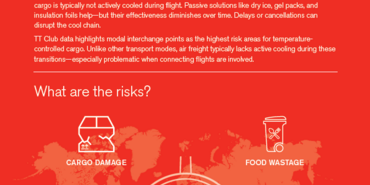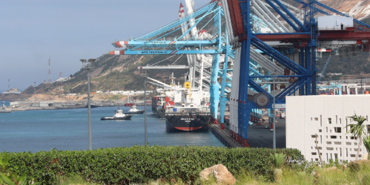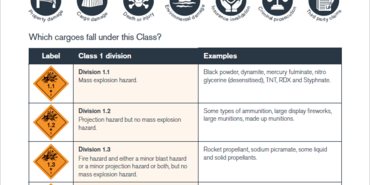Loss Prevention a year in focus 2021
At the start of 2021, there was great optimism following the impact of the COVID-19 pandemic through 2020. Countries grappling with its challenges took varying measures to control the spread of the virus and in doing so continued to unbalance trade flows, volumes and equipment availability. The development of several vaccines were welcome news and industry attention quickly switched to how to deliver such an invaluable cargo to every corner of the globe. Coping with unprecedented troughs in 2020 and then peaks in demand in late 2020 and throughout 2021 has undoubtedly presented the industry with many challenges, which in the large part they have admirably overcome.
From abandoned cargo risks to ship fires, from Brexit to supply chain security, TT Club has stood together with its Members and the wider industry throughout 2021 identifying potential risks, analysing the impact these may have and providing loss prevention guidance both to raise awareness and to mitigate risk.
Please join us then, as we look back at a year with loss prevention in focus.
As the magnitude of the impact of COVID-19 continued to surprise, the blockage of the Suez Canal for six days in March was a significant and unwelcome distraction for those in the supply chain. Immediately attracting the attention of mainstream media across the globe, it served to place the supply chain further into the limelight. The cause remains under investigation, but regardless, the globe saw how a single serious incident could impact every aspect of the supply chain. The ramifications for the industry were many, including the immediate delays experienced, through to the additional stresses that this placed on the balance of available equipment where it was required most. Strong demand for many commodities and across key trade routes has been compounded by imbalances in container availability, posing significant operational challenges. The knock-on effect being that businesses that ship goods internationally in every sector faced sharp increases in freight costs and in some instances, less reliable service caused by increasingly unpredictable congestion and delays.
The challenges faced by the industry in 2021 are largely set to continue into 2022 and potentially beyond. While it is conceivable that the imbalances of container equipment will resolve themselves back to pre-pandemic levels, the fact is that consumer behaviour driving volumes has arguably irreversibly shifted through this same period. The disparity between volumes of trade flowing from Asia has seemingly become ever more stark, resulting in greater demand for empty equipment in Asia. Achieving the pre-pandemic balances therefore should not be the focus and is arguably not going to resolve the challenges currently faced by the industry. Many actors in the supply chain have considered resilience in their logistics models and this will continue to be a focus in 2022. Recognising dynamic circumstances and change will afford opportunities to react effectively. It is generally accepted that there is no immediate fix back to the world in which we used to trade and operate, returning to the pre-pandemic norm is arguably no longer possible, driven by changes in consumer demands. Those who elect to embrace new technologies, new ways of working, new operational strategies and new customer demands and expectations will have the greatest opportunity to flourish in the coming years.
From abandoned cargo risks to ship fires, from Brexit to supply chain security, TT Club has stood together with its Members and the wider industry throughout 2021 identifying potential risks, analysing the impact these may have and providing loss prevention guidance both to raise awareness and to mitigate risk.
Documents
TT Club Loss Prevention Year in focus 2021 Digital (2.60 MB) 02/03/2022
- Author
- TT Club Loss Prevention
- Date
- 01/02/2022






